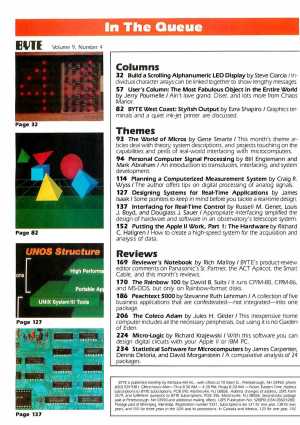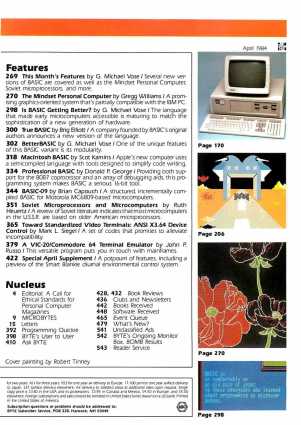
Individual character arrays can be linked together to show lengthy messages.
[author : Steve Ciarcia]
Ain't love grand, Diser, and lots more from Chaos Manor.
[author : Jerry Pournelle]
Graphics terminals and a quiet inkjet printer are discussed.
[author : Ezra Shapiro]
This month's theme articles deal with theory, system descriptions, and projects touching on the capabilities and perils of real-world interfacing with microcomputers.
[author : Gene Smarte]
An introduction to transducers, interfacing, and system development.
[author : Bill Engfemann and Mark Abraham]
The author offers tips on digital processing of analog signals.
[author : Craig R. Wyss]
Some pointers to keep in mind before you tackle a real-time design.
[author : James Isaak]
Appropriate interfacing simplified the design of hardware and software in an observatory's telescope system.
[author : Russell M. Genet, Louis J. Boyd, and Douglass J. Sauer]
How to create a high-speed system for the acquisition and analysis of data.
[author : Richard C. Hallgren]
BYTE's product-review editor comments on Panasonic's Sr. Partner, the ACT Apricot the Smart Cable, and this month's reviews.
[author : Rich Malloy]
It runs CP/M-80, CP/M-86, and MS-DOS; but only on Rainbow-format disks.
[author : David B. Suits]
A collection of five business applications that are confederated - not integrated - into one package.
[author : Stevanne Ruth Lehrman]
This inexpensive home computer includes all the necessary peripherals, but using it is no Garden of Eden.
[author : Jules H. Gilder]
With this software you can design digital circuits with your Apple II or IBM PC.
[author : Richard Krajewski]
A comparative analysis of 24 packages.
[author : James Carpenter, Dennis Deloria, and David Morganstein]
Several new versions of BASIC are covered as well as the Mindset Personal Computer, Soviet microprocessors, and more.
[author : G. Michael Vose]
A promising graphics-oriented system that's partially compatible with the IBM PC.
[author : Gregg Williams]
The language that made early microcomputers accessible is maturing to match the sophistication of a new generation of hardware.
[author : G. Michael Vose]
A company founded by BASIC's original authors announces a new version of the language.
[author : Brig Elliott]
One of the unique features of this BASIC variant is its modularity.
[author : G. Michael Vose]
Apple's new computer uses a semicompiled language with tools designed to simplify code writing.
[author : Scot Kamins]
Providing both support for the 8087 coprocessor and an array of debugging aids, this programming system makes BASIC a serious 16-bit tool.
[author : Donald p.George]
A structured, incrementally compiled BASIC for Motorola MC6809-based microcomputers.
[author : Brian Capouch]
A review of Soviet literature indicates that most microcomputers in the U.S.S.R. are based on older American microprocessors.
[author : Ruth Heuertz]
A set of codes that promises to alleviate incompatibility.
[author : Mark L. Siegel]
This versatile program puts you in touch with mainframes.
[author : John P. Russo]
A potpourri of features, including a preview of the Smart Blankie diurnal environmental control system.
A CALL FOR ETHICAL STANDARDS FOR PERSONAL COMPUTER MAGAZINES
As a reader and a consumer, you have the right to know whether you can rely on the honesty and objectivity of articles in this and other personal computer magazines. Some common but unpublicized practices in this field raise serious ethical issues and can compromise a magazine's integrity. We want to inform you of these practices and to state our policies on them.
NO "EDITORIAL" DISCOUNTS FOR BYTE STAFF MEMBERS
Some computer manufacturers and public relations agencies offer editors of personal computer magazines discounts of as much as 50 percent on both equipment and software. As a result, informed readers must wonder if a glowing article on a new computer was inspired by an honest evaluation or feelings of profound gratitude.
Discounts on hot new computers are a serious temptation for people who are as interested in computers as BYTE editors are, but we can't accept anything more valuable than a meal. We simply don't think that we or anyone else could remain objective after receiving such a favor.
Although staff members are not allowed to accept the loan of any equipment for their personal use, the magazine itself will accept long-term loans of single computers of each make in order to run software written for them. This policy applies equally to all manufacturers and is intended to help us extend coverage to more machines than we are able to buy. We return review machines unless the manufacturer offers to extend the loan to us, which seldom happens. To date, we have returned review disks of software, but the volume is now so enormous that we are considering keeping disks unless the publisher specifically requests return.
NO EXPENSE-PAID TRIPS
On occasion, BYTE receives invitations to send an editor on an expensepaid trip to a resort, a European capital, or some other almost irresistible setting for a "press conference." In principle, we can go on such a press excursion provided we pay our own way, all our competitors are going as well, and the trip has a legitimate journalistic purpose. But we don't believe that we can write objectively after flying free of charge to Paris or London and contemplating a new computer through a cloud of champagne bubbles. In practice, we just don't go on junkets, not even when told that all our competitors are going and that advertisements will be canceled if we don't go.
NO FAT SPEAKER'S FEES
BYTE staff members can't take money from advertisers or anyone likely to be the subject of coverage in BYTE. This applies to remuneration for speaking engagements. BYTE editors can accept paid transportation to the site of a speech but no fee for the speech beyond an honorarium of $50 or $100.
DISQUALIFICATION FROM STORIES BECAUSE OF STOCK OWNERSHIP
No BYTE staff member can write about the products of any company in which he or she owns stock. For maximum journalistic freedom and objectivity, BYTE staff members should avoid owning stock in any company that is part of the industry we cover.
AN AUTHOR'S CONNECTIONS MUST BE CLEAR
Many of the people who are doing interesting things with computers work in the personal computer industry. We want such people to write nonpromotional articles for BYTE that shed light on some interesting aspect of technology, but we require that the authors' company affiliations be stated with the article. This policy sometimes prevents us from publishing an article that we like. A case in point: one author works for a major manufacturer of personal computers but is writing as an enthusiast about aspects of personal computing that are not involved in his job. The manufacturer forbids the employee to mention the company name unless the article is job-related. We can't publish the article without stating the company name. The author is caught in between, but we value this policy more than any single article.
NO FAVORITISM TO ADVERTISERS IN EDITORIAL COVERAGE
We write about products when we think that our readers will find them interesting. Decisions about editorial coverage are made without regard to whether related advertisements have been or will be placed in BYTE. Once in a great while, an advertiser who is accustomed to standards different from BYTE's will demand so-called "editorial support" and say that some other publications provide it and we don't. This is particularly awkward when we are planning to cover the related product anyway; we don't want the advertiser to think that we have bowed to pressure and will allot coverage on demand.
EDITORS DETERMINE THE EDITORIAL THEMES
Some editors at other publications have told us that the advertising department or business office sometimes tells them to do, let's say, an issue on "peripherals." Such issue themes are evidently wonderful frameworks around which to assemble advertisements. The editors of BYTE determine the themes of its issues independently. Our issues on simulation, real-world interfacing, computers and the disabled, benchmarks, Smalltalk, and so on, may not relate as directly to some advertisers' products as salespeople like. These themes do, however, attract readers who are intensely interested in computers. From the business standpoint, the hope is that these readers will see and act on the advertisements; reader surveys seem to bear this out. From the editorial standpoint, we choose themes based on their inherent interest and their appeal to our readers.
NO PRIVILEGED RELATIONSHIPS WITH COMPANIES IN THE FIELD
Although we enjoy working with companies well in advance of product announcements, we are glad that BYTE's welfare doesn't depend on the cooperation or the success of any single company in the industry. We prize our independence, our objectivity, and our freedom to cover what we choose in the manner we choose.
This is not to begrudge any company or companies their success or to say that machine-specific publications are necessarily bad. Nevertheless, we enjoy being exempt from the whole set of ethical issues confronting magazines that cover a single computer or a single company's computers. We can state our opinions without wondering what The Only Company will think. We can point-out that The Only Machine has too little memory or a comparatively weak central processing unit or a power supply with hardly a milliampere to spare. Machine-specific magazines risk the loss of readers if they point out too many faults in The Only Machine. We serve our readers by pointing out all the faults we find.
The BYTE policies described above are nothing more than your due as a reader, and you may have believed that such policies go without saying at every magazine. But this is yet another area in which this young industry lacks standards. We pledge to do our best to safeguard our editorial integrity and to serve your interests as a personal computer user, and we call upon other magazines to do so as well.
-Phil Lemmons, Editor in Chief

